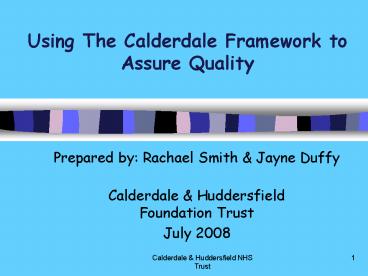Using The Calderdale Framework to Assure Quality - PowerPoint PPT Presentation
1 / 27
Title:
Using The Calderdale Framework to Assure Quality
Description:
Improves patient experience right person at the right time with the right skills' ... Based on Functional Model of Delegation (Saunders 1996) ... – PowerPoint PPT presentation
Number of Views:96
Avg rating:3.0/5.0
Title: Using The Calderdale Framework to Assure Quality
1
Using The Calderdale Framework to Assure Quality
- Prepared by Rachael Smith Jayne Duffy
- Calderdale Huddersfield Foundation Trust
- July 2008
2
WHY BOTHER ! ?
3
National Context
- Leitch Report - The skills agenda
- Our NHS,Our Future Darzi review
- Skills for Health
- Health Social care Bill 2007
4
Reasons for delegation and skill sharing
- Improves patient experience right person at
the right time with the right skills - Increasing demand on services
- Maintain service quality whilst controlling costs
5
Delegation carries potential risk!
- Assistant responsible for the task
- Delegator remains accountable
6
Risks in delegation (professional)
- Variation in what is delegated
- Variation in how task is to be delivered
- Variation in documentation
7
Risks in Delegation (assistants)
- Lack of skill/training to fulfil task (unknown
competence) - Unable to read/follow written plan
- Unsure when to seek help/abort task
- Boundary not clear
8
Advantages of Competency Approach
- Organisations
- Consistency safety
- Efficient effective
- Improved productivity
- Competitive edge
- Employer of choice
- Mobile flexible staff
- Improved patient satisfaction
- Reduction in risk
- Better assessment on quality
- Teams Individuals
- Core team objectives
- Clear roles
- Clear responsibilities
- Better understanding
- Cross boundary working
- Enjoyment
- Personal team development needs
- Portable passport
- (Chris Mullens NWP Conference 2007)
9
In The Beginning..!!
10
The Functional Model of Delegation (
Saunders 1996, 1997 )
Systematically addresses factors in delegation
Manages risks inherent in delegation
Known standard of care Ensures quality of care
11
The Functional Framework for Competency
- Developed by Rachael Smith Jayne Duffy (2007)
- Based on Functional Model of Delegation (Saunders
1996). - Provides framework to manage delegation blurred
boundary working.
12
Evolution .. !!
1996 FMD to manage delegation in early discharge
team
2000 FMD in Multi-Disciplinary Community Teams
blurring boundaries
2006 FFC across therapies. Core and service
specific competences
13
Voilà The Calderdale Framework
emerges !!
14
The Calderdale Framework
- CF is the result of evaluation further
development of Saunders original Functional Model
of Delegation. - (R Smith J Duffy 2007)
15
The Calderdale Framework 7 Stages to Successful
Implementation
Raise awareness and engage key staff
Identify Service Functions And Tasks
Decision table Saunders
(1996) Smith Duffy
(2007)
Assess suitability of tasks for delegation
www.skillsforhealth.org.uk
Map tasks to Skills for Health/- write
local competences
16
Implementing The Calderdale Framework
Set up supporting systems
- Professional
- Assistants
Training
Sustaining
17
So, How do You do it?
18
Service Analysis
- What does the service do
- When and Where is the service delivered
- What tasks are carried out
- How do you deliver these tasks
19
Orthopaedic Early Discharge 7 day (9am-9pm)
service for elective cases. staffed by Physio,OT
Assistants.
- Tasks to
Run Service - Subtasks
Triage,assess,plan,treat,delegate, Evaluate,liase,
document,discharge
Treatment
Equipment
Mobilise
Exercise
stretches
e.g. Quads SQ, SLR, TRQ..
Function
Strength
20
TASK ANALYSIS
KNOWLEDGE BASED
SKILL BASED
RULE BASED
21
Skill Mix Review
Qualified staff Blurring professional boundaries
Tasks mainly Knowledge Skill based
Delegate to support staff.
Tasks mainly Skill Rule based
22
Competences from tasks
- Tasks analysed for suitability to delegate using
decision tables. - Consensus gained from peers.
- Map to SfH competences.
- Accepted tasks not on SfH written as local
competences. - Comprehensive training package for qualified
support staff developed.
23
Risks Managed Through
- Competences
- Reduce variation in WHAT tasks are
- delegated HOW they are delivered.
- Documentation
- Standardised
- Communication
- Clarity re when to seek help/stop.
- Feedback supervision.
24
So What.??
25
Benefits of Calderdale Framework
- Delegation risks managed Competent staff
- Fast track to NVQ 3 with staff fit for
purpose - Effective skill sharing cross professions
- Quality assurance for patients
- Improved documentation
- Skill mix reviewed
26
Benefits of CF across CT R Directorate
- Skill Mix Pre 15.7
Post 14.8
(Shift to non
qualified staff) - Activity Pre 372803
Post 421284
(Increased
activity) - Hours lost to sickness Pre 10552
Post 4900
(Sickness halved) - Risk Score Pre risk score
9
Post risk score 2 - Patient Satisfaction Complaints down from 79
- 34
27
In summary
- The Calderdale Framework provides a framework to
manage delegation. - The Calderdale Framework leads to the
identification of competences which link to NVQ - The Calderdale Framework is transferable to any
setting (as it is based on patient service
needs). - The Calderdale Framework is transferable to
blurred boundary working can lead to protocol
development































